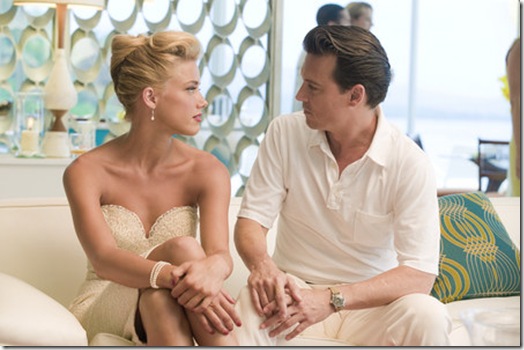Why do filmmakers continue to adapt Hunter S. Thompson’s unfilmable pseudojournalism into movies? Critics and audiences alike lambasted the Thompson adaptations Where the Buffalo Roam and Fear and Loathing in Las Vegas, but that hasn’t prevented the green-lighting of The Rum Diary, a screen version of Thompson’s first published novel, about a freelance journalist’s misadventures in Puerto Rico at the dawn of the ‘60s.
The faithful movie version of Fear and Loathing worked, to some extent, because director Terry Gilliam had an uncompromising artistic vision; his customary bravura style of Bunuelian surrealism trumped a narrative that was justly dismissed as eye-rolling, drug-glorifying juvenilia. This time, Bruce Robinson, the cult director behind such ‘90s British imports as Withnail and I and How to Get Ahead in Advertising, does his best to inject some personal touches of deadpan wit into a project that is, for all intents and purposes, Johnny Depp’s.
A friend of Thompson’s, Depp was so intent on playing one of the writer’s surrogates for the second time that he all but paid for this film’s production out of pocket after it failed to make it past the development stage twice before. It’s easy to see why. The Rum Diary is an overlong progression of forgettable nihilism – a narcissistic vanity project that focuses once again on the author’s incessant drug life to the detriment of what could have been an interesting story.
As the gonzo writer Paul Kemp, Depp doubles down on his Thompson impression from Fear and Loathing in Las Vegas, only this time without the motley attire. He still speaks in clipped, staccato sentences, his face conveying a perpetual state of hangover. He begins the film by emerging from the boozy cocoon of his trashed hotel room in San Juan for a job interview with a fictional island newspaper.
The scenes in the newsroom – the kind of clangorous, sepia-toned, smoke-filled writers’ hovels we remember from old movies – are the best ones in The Rum Diary. The dialogue is hilarious, the atmosphere is kinetic and Richard Jenkins steals many scenes as a harried editor in an awful toupee: “You’re not, uh … artistic, are you?” he asks Kemp, prying about the man’s sexuality.
Kemp is unhappy at his new job, relegated to writing horoscopes and covering bowling alleys for his paper, a vapid rag tailored to moneyed tourists. His proposals for serious investigate pieces rejected, Kemp eventually falls under the spell of dapper industrialist Sanderson (Aaron Eckhart) and his sex-bomb wife Chenault (Amber Heard). Kemp desires the latter, so he gets into financial bed with the former, accepting his offer to promote the building of a skyscraper hotel on another island – a move that would crush the civilizations of its local islanders and turn pristine land into another tourist playground and tax haven.
Sanderson lives in a billion-dollar compound with a yacht, a private beach and sports cars galore, and has constructed an invisible force field between his luxurious accommodations and the teeming masses of peasants rioting for a living wage immediately outside.
I’d like to think The Rum Diary has a social and political conscience, that it has a soul of some kind. Occasionally, I was bowled over by its intelligence: Watching the 1960 presidential debate on television, Kemp wittily rebukes Richard Nixon (one of Thompson’s lifelong arch-nemeses), then astutely articulates that, decades later, radicals will have infiltrated the government so successfully that Nixon would be considered a liberal. This kind of talk isn’t just the work of a clever screenwriter throwing out red meat for a modern liberal audience who has lived through exactly this prophecy; Thompson really did speak these opinions when no one else did, and his words continue to resonate beyond his grave.
Unfortunately, these aren’t the words that consume most of The Rum Diary. The source material is far less eloquent, and eventually the movie falls under the languor of the hallucinogens its characters absorb, crushing its momentum. We see a bit too much of Giovanni Ribisi’s obnoxious Moburg – the newspaper’s squirrelly voiced, Hitler-admiring addict – and the story becomes bogged down in drug trips and cockfights.
The legitimacy of Thompson’s groundbreaking, industry-altering journalism is once again eschewed in favor of sensationalistic escapades that wouldn’t be out of place on The Dukes of Hazzard, if it were directed by Roger Corman. Nobody gets shorter shrift in this self-indulgent male fantasy than Amber Heard, whose only apparent direction was to look and sound objectified. She has the depth of a thimble and, much as I’d love to believe otherwise, the movie does, too.
THE RUM DIARY. Director: Bruce Robinson; Cast: Johnny Depp, Aaron Eckhart, Michael Rispoli, Amber Heard, Richard Jenkins, Giovanni Ribisi; Studio: FilmDistrict; Rating: R; Opens: Friday at most commercial houses
